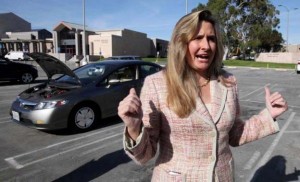
Heather Peters with her 2006 Honda Civic Hybrid. A Superior Court overturned her small claims victory.
A California Superior Court Judge has reversed the high-profile verdict in a small claims case filed by a woman who claimed her Honda Civic Hybrid delivered significantly worse than the maker’s advertising claimed it would.
The original case, filed by Heather Peters, won a judgment of nearly $10,000 to cover her increased fuel bills and reduced trade-in value. Peters had decided to fight Honda on her own in Small Claims Court rather than participating in a class action settlement she argued would not adequately compensate owners of 2006 to 2008 Civic Hybrids.
“We are never satisfied when a customer is anything less than satisfied with one of our products, and the company does not relish the necessity to defend the truth in opposition to any of our customers,” said a statement from American Honda Motor Co.
But the maker also said it “is pleased with the Court’s decision which affirms that Honda was truthful in its advertising of the fuel economy potential of the 2006 Honda Civic Hybrid. We are thankful for the support we received from the many satisfied Civic Hybrid owners who expressed their support throughout the legal process.”
Whether it was truthful is likely to continue to be debated, however, despite Honda’s victory in the latest case – and 16 of 17 other small claims suits it has successfully defended in recent months.
The maker argued that it was acting properly when it claimed in advertising and other promotional material that the 2006 to 2008 Civic Hybrid would get 50 mpg. That number was based on EPA testing and was used in the vehicle’s so-called “Munroney” window sticker, as well. In the original court hearings earlier this year, a Honda representative told the court that the maker was required to use EPA data when promoting the mileage of its products.
That position was reflected in the ruling by Superior Court Judge Dudley W. Gray II, who wrote that, “Federal regulations control the fuel economy ratings posted on vehicles and advertising claims related to those fuel economy ratings.”
In fact, EPA officials have told TheDetroitBureau.com that a maker can advertise any mileage number it believes is accurate up to the figures achieved in government mileage tests. But makers traditionally use the maximum figure even when they are aware such tests might be overly optimistic. In fact, the EPA subsequently revised its test procedures to acknowledge the fact that most hybrids delivered lower fuel economy in real-world use.
In fact, Honda last month received approval by yet another California court to move ahead with a settlement in a class action case that had also challenged its mileage estimates. That settlement will provide owners with $100 to $200 in cash along with a discount coupon for another Honda vehicle.
Critics – including Peters – felt the settlement worked largely in favor of Honda as it effectively helped drive disgruntled Civic Hybrid owners back into showrooms.
The Los Angeles housewife – who previously served as a corporate lawyer and revived her license before the appeal – tried to put a good spin on her latest setback.
“Of course I’m disappointed,” said Peters, “but I’m still glad that I raised awareness that Honda is no longer the great brand that it used to be. They used to go the extra mile in customer service, now they go the extra mile fighting customers in court.”
Peters had chosen to try her initial case in Small Claims Court because it restricts both sides, barring the use of lawyers, for one thing. She had encouraged other disgruntled Honda owners to opt out of the class action settlement and pursue their own cases, as well. But with her initial victory overturned, Honda has now lost only one of 18 suits that have taken that route.
Under California law, Peters has no further appeals option on a small claims verdict.

So does Peters have a case against the EPA since they “control the fuel economy ratings”?
I don’t understand how the appeal overturned the first verdict yet Peters has no recourse….big business wins again? Screw the consumer.
Sad.
Hi, Jerz,
I have to admit I am also confused by the judge’s opinion which makes the EPA effectively the final arbiter since Honda has agreed to a class action settlement on the same matter in which it agreed to pay (albeit small) owners of the same era Civic Hybrid for falling short of mileage claims. Here, however, is the issue that seems to always get lost: in a conversation with senior EPA officials a few years back I was clearly advised that automakers can advertise ANY number UP TO what the EPA determines. In other words, if Honda knew its hybrids were only going to get 30 mpg, not 50, in real-world use that’s what they could have posted. But no maker ever does that. They always go for the max. And unless they are held accountable for that they will never tell the consumer anything but the rosiest of pictures. It’s intriguing to see that manufacturers have become much more (well, relatively) more honest on horsepower and performance numbers having been sued over optimistic claims. Of course, the makers don’t have a fallback that now effectively shields them from any claim. The SAE may carry weight and sway a court but it’s not the same thing as what the California judge just ruled: If the EPA says it you can’t contest it.
Paul A. Eisenstein
Publisher, TheDetroitBureau.com